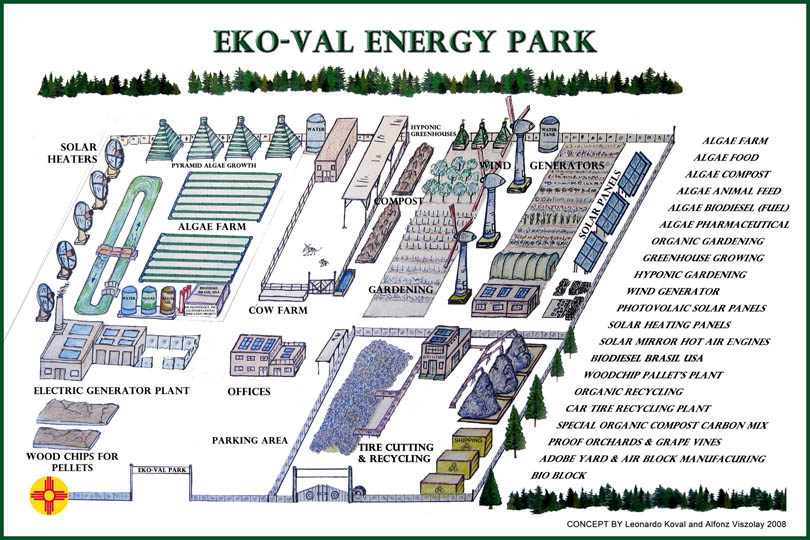It’s an algae oil farm, a dairy farm, vegetable truck farm, a power station, and a classroom! and it’s coming to Santa Fe!

Integrated systems, jobs, and hands-on learning.
As we seek security and resiliency in times of impending climate change crises, peak oil production, rising prices, dependency on foreign oil, and long distance supply chains, some innovative individuals think we can transform our energy and food systems into decentralized, green, regional food-, water- and energy-sheds.
For twenty years Alvonz Visolay has been studying bioremediation using algae, and he has built algae production facilities that generate a wide array of products for the pharmaceutical and cosmetic industries. For the last two years, Visolay and Leonard Koval have been looking for a site to create a prototype educational, alternative energy park that will produce marketable algae oil.
The 30-acre stand-alone “Eko-ValPark” will be built on the outskirts of Santa Fein an industrial park setting. Their enterprise could help lead a metamorphosis of energy production. Imagine a decentralized green fuel and food production facility using recycled water, where looping waste streams give students a real world learning experience and a wage.
You could call it an algae ranch! Water and oil will be extracted from algae grown on-site. The water returns to the pond, the oil goes into 5-gallon drums, and the remaining dried, high-protein algae is harvested.
The dried algae is then fed to cattle. You could call it a cattle ranch! Manure from the livestock then goes through an anaerobic digestion process and comes out as well-balanced fertilizer, with methane (natural gas) as an additional product. You could call it a fertilizer and green gas production facility!
The fertilizer and heat will then be channeled into greenhouses, hydroponic facilities, gardens and orchards. You could call it an organic vegetable farm!
This livestock, algae, organic vegetable farm/ranch will also include an electrical generating station, feeding power into PNM’s grid – green energy supplied by solar panels, wind turbines and highly efficient biomass incineration.
As you can see in the accompanying graphic, to accommodate emerging technologies, location and market demand, all sorts of processes can be added to this eco-park.
Earning and learning at the Eco-Park is just the kind of hands-on curriculum that could attract a wide range of students, including those who don’t do well in a classroom. Visolay’s Eco-Park aims to give students tools for tomorrow’s jobs. Students of all ages will benefit as cutting-edge laboratory techniques and inventions are proven locally. Emerging advanced processes, such as using tires to produce fuel in an electromagnetic field-controlled pyrolysis, will be monitored to prove that they are indeed, non-polluting.
As we learn to work with these natural biological, agricultural and industrial processes, Visolay expects that we will learn how to more efficiently integrate green energy, food production, recycled water and an educational component into our existing neighborhoods. Greater efficiency lowers the cost of living. If farmers, energy producers, schools and their employees have not only affordable housing, but an affordable lifestyle, local food, energy and job training can become more secure and resilient. Living in non-polluting systems that tread lightly on the planet create a higher quality of life for all. The future is ours to win. Whether located in rural, urban or suburban settings, eco-parks and Sustainable Urban Villages could be essential drivers of the emerging sustainable economy.